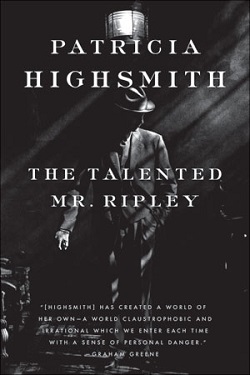What if someone wrote the inverse of The Great Gatsby, in which a social outsider beat the wealthy at their own game? Welcome to The Talented Mr. Ripley, by Patricia Highsmith.
As the book opens, Tom Ripley is being followed. He doesn’t know by whom or why, but he’s scared. By the end of chapter one, we have ridden the arc that will replay through the entire novel: Tom is pursued; Tom turns predator into prey.
It is the 1950s. A Manhattan businessman wants to retrieve his playboy son from an Italian fishing village called Mongibello. Dickie Greenleaf has been loafing there for months, on his father’s dime. Rather than simply cut his son off, Mr. Greenleaf yearns to bring him home without conflict.
Dickie’s father mistakenly thinks that Tom runs in the same social circles as his son. He offers him a first-class ticket to Italy in exchange for trying to persuade Dickie to come home. Mr. Greenleaf thinks that a friend can succeed where a stodgy father has failed. What is it about the rich? They don’t know how the world works.
Tom has been living in a fleabag apartment, he’s behind on rent, and bill collectors are writing. His life is dingy and small. He has few friends, and none he likes. He accepts Mr. Greenleaf’s offer after encouraging the misconception that he and Dickie are pals. With thousands of dollars transferred into his bank account, Tom buys a new set of clothes and departs for Italy.
If you’ve seen the 1999 movie version starring Matt Damon, you haven’t met the Tom Ripley that Patricia Highsmith dreamed up. I rarely like a movie as much as its source material, but I loved Anthony Minghella’s film adaptation. Still, it is important to note the dramatic difference between the novel and the film.
The book is about a man who both lies and murders in cold blood. Ripley has some emotions, to be sure, some withered embryonic human needs, but he is far from a sympathetic character. He is a bundle of intelligence and odd talents in search of a soul. Highsmith briefly alludes to his painful childhood and the cruelty of the aunt who raised him, but her focus is on who he is now, not on what shaped him. And what is he now? He’s a sociopath. When his resentment boils, he quietly rearranges reality.
The film is about a man who is desperate to belong, hungry for a companion with whom to share his sexuality, and envious of the “haves” in every sense of the word. This Ripley murders—at least the first time—in a moment of passion.
The film humanizes and motivates Ripley’s chess moves in a way that Highsmith would no doubt see as a betrayal of her creation. Still, the film does not abandon the central preoccupation of the Ripley novels: the wall between the haves and the have-nots, and the contrast between the whims of the extravagant and the steely focus of the downtrodden. The book passes no judgment on Tom; in fact, the book implies that the rich are at least as psychopathic as a murderer.
When Dickie welcomes him into his exclusive world, Tom sheds his shabby past and revels in his new identity. He goes to jazz clubs in Paris and he sails on yachts. The two young men even work together to deceive Mr. Greenleaf. But neither Dickie’s girlfriend nor his other elitist buddies take to Tom. Soon enough, the in-crowd convinces Dickie that Tom is a parasite.
Dickie feels no remorse in abruptly announcing the end of their friendship. Dickie is disgusted by Tom’s worshipful attention and his sexual preferences, and he feels no need to hide his contempt. Tom was a passing diversion, and his use has expired. Tom is humiliated, defeated, and facing a return to his fleabag existence. Alas for Richard Greenleaf, his carelessness with Tom’s feelings is no match for Tom’s gymnastic opportunism.
Of course, once Tom bloodies his hands, he must cover his tracks. We follow him through Europe as he eludes discovery, shifts identities, and spills blood when necessary. We see him live more fully in someone else’s shoes than he ever could in his own. We sweat watching him juggle the many acquaintances of his recent victims.
After departing Ripley’s suffocating universe, you can decide if you are ready to handle the sequels. Take your time. Ripley has all the patience in the world.








